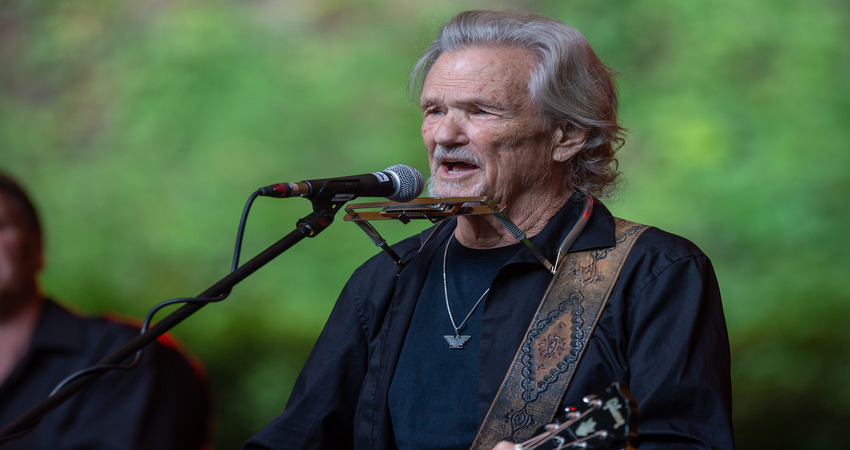Kris Kristofferson, who achieved success as a country music singer, songwriter and both a Hollywood film and TV star, died Saturday at his home in Maui, Hawaii. No cause of death was given, but he died peacefully while surrounded by family. He was 88 years old.
“It is with heavy hearts that we share the news that our husband/father/grandfather, Kris Kristofferson, passed away peacefully at home on Saturday, September 28,” his family said in a statement. Everyone is very happy for their time with him. Thank you for loving him all these years, and when you see the rainbow, know he’s smiling down on us all.” The statement was delivered by Kristofferson’s wife, Lisa. eight children, Tracy, Chris Jr., Casey, Jesse, Judy, John, Kelly and Blake; and seven grandchildren;
Kyle Young, CEO of the Country Music Hall of Fame and Museum, said, “Kris Kristofferson believed at his core that creativity is a God-given gift, and that those who ignore or deny such a sacred gift. Deny they suffer failure and unhappiness. He preached that the life of the mind gives voice to the soul, and then he produced a body of work that gave voice not only to his spirit but also to ours. Chris’s heroes included prizefighter Muhammad Ali, the great poet William Blake, and ‘Hill Billy Shakespeare’ Hank Williams. He lived his life in a way that honored and exemplified the values of each and every one of them, and he left a righteous, brave and glorious legacy that remains with him.”
Kristofferson had already spent several modestly successful years in Music City’s songwriting ranks by the time he wrote such No. 1 country hits as “For the Good Times” (Ray Price, 1970), “Sunday Morning Coming Down.” Johnny Cash, 1970) and “Help Me Make It Through The Night” (Sammy Smith, 1971). His song “Me and Bobby McGee” became a posthumous No. 1 pop hit in 1971 for his former lover Janis Joplin.
His first four albums for Monument Records, featuring his rough, unhinged vocals and poetically crafted, proto-outlaw country songs, all reached the country top 10, and 1972’s ” Jesus Was a Capricorn”, which was his No. 1 country hit. Why Me, topped the country LP chart. He won three Grammys: for Best Country Song (“Help Me Make It Through the Night“) and for a duet with Rita Coolidge, to whom he was married from 1973-80.
Bill C. Malone notes in “Country Music, USA,” the standard history of the genre, “Kristofferson’s lyrics often deal with loneliness, alienation, and pain, but they also celebrate freedom and honest relationships, and It was done in intimate, sensitive language, rare for country music.
Kristofferson may be the first to knock his voice off. “I don’t think I’m that good a singer,” he said in a 2016 Rolling Stone interview. “I can’t think of a song I’ve written that I don’t like that someone else sang better.” But with so many of his signature songs, fans wouldn’t want to be transported by another voice, least of all one that channeled their raw emotions.
The musician’s lean good looks and calm personality made him a natural for photographs. He made his screen debut in Bill L. Norton’s 1972 feature “Cisco Pike,” in which he played the titular character, an L.A. musician and drug dealer under the thumb of a corrupt drug cop (Gene Hackman). was under The feature also featured several of Kristofferson’s songs on its soundtrack.
During the 70s, he enjoyed a rising film profile, playing the romantic lead opposite Susan Anspach in Paul Mazursky’s “Bloom in Love” (1973) and Martin Scorsese’s “Alice Doesn’t Live Here.” (1974) Oscar winner Ellen Burston. In 1977, alongside Barbra Streisand, he won a Golden Globe Award as a dissolute rock star in the third version of “A Star is Born.”
However, he hit hard in a pair of legendary Hollywood productions. He co-starred with James Coburn in Sam Peckinpah’s ambitious 1973 western “Pat Garrett and Billy the Kid,” appearing as the infamous bandit. The film became an infamous celebrity when it was taken out of the hands of the director and re-cut by MGM. (Christopherson starred in Peckinpah’s “Convoy” (1978), based on CW McCall’s CB Radio theme hit; while the film made money, the actor’s notes were disappointing.)
Despite withering criticism, Kristofferson always strongly defended “Heaven’s Gate”, which later received critical acclaim. In a 2012 video interview included on the film’s Criterion Collection home video release, he said, “Both Michael and his film deserved better… [it] deserved that work of art.” should be treated as such, not as a failed economic venture.”
During the 80s, he gradually regained his career footing. Along with Willie Nelson — who recorded the best-selling album of Kristofferson’s songs in 1979 — he co-starred in Alan Rudolph’s 1984 feature “Songwriter.” Their combined song score received an Academy Award nomination.
In 1985, Kristofferson, Nelson, Johnny Cash and Waylon Jennings teamed up for the album “Highway Man,” a No. 1 country album that introduced the outlaw country supergroup. Eventually known as the Highwaymen, the quartet released two more acclaimed albums in 1990 and 1995.
Despite small roles, his film career continued rapidly. He eventually made over 100 film and TV acting appearances. In 1996, he won rave reviews as a depressed Texas lawman in John Sayles’ “Lone Star.” In 1998, he made his first of three appearances in the popular comic book franchise “Blade” as vampire hunter Abraham Whistler opposite Wesley Snipes.
After parting ways with Monument in the early ’80s, Kristofferson recorded only sporadically solo. Nevertheless, he received rave reviews for three poignant and personal latter-day albums – “A Moment of Forever” (1995), “This Old Road” (2006) and “Closer to the Bone” (2009) – which Don was drawn naked. He released 2013’s “Feeling Mortal” on his KK Records imprint.
A 2004 inductee into the Country Music Hall of Fame, Kristofferson received a Lifetime Achievement Award from the Recording Academy in 2015.
He was born on June 2, 1936 in Brownsville, Texas. His father was a career Army Air Corps and Air Force officer, and his family moved frequently. He attended high school in San Mateo, California, where he proved to be both a strong student and a gifted athlete. He graduated summa cum laude from Pomona College with a degree in English and attended Oxford University in England as a Rhodes Scholar.
While in the UK, Kristofferson cut his first record as Chris Carson. However, upon returning to America, he joined the army under pressure from his family. He eventually achieved the rank of captain, and was able to pilot a helicopter. However, upon starting an assignment to teach English at West Point, he left the Army, and in 1965 he moved to Nashville to pursue music full-time. His family immediately cut ties with him.
Kristofferson dabbled in Music City for four years, working as a commercial helicopter pilot and cleaning the local studio for Columbia Records (where he recorded in the city with his future “Pete Garrett” co-star Bob Dylan). first crossed paths in town to record “Blonde On Blonde”). To convince one of country music’s most prominent acts to pay attention to his songs, one such In an incident that became a Nashville legend.
Johnny Cash later recalled, “I didn’t really hear him until one afternoon, he was flying a National Guard helicopter and he landed in my yard. I was taking a nap and Jon said, ‘Some idiots.’ has landed a helicopter in our yard, they used to come from the road, now they are coming from the sky!’ And I look up, and here Chris comes out of the helicopter with a beer in one hand and tape in the other.
As recorded by Cash, live on “The Johnny Cash Show,” Kristofferson’s “Sunday Morning Coming Down” became one of the writer’s first major hits, and was named Country Music Artist of the Year by the Country Music Association. Honored as a song. He accepted the award in a famous televised manner.
Now legitimized as one of the country’s most prominent hit-crafting writers – with notable covers by other top talent such as Ray Stevens, Bobby Bear, Roger Miller and Waylon Jennings to his credit. A long-term contract was signed on the monument. Her 1970 debut LP “Christopherson” sold poorly, but it reached No. 10 on the country chart in 1971 after the label named the set “Me and Bobby McGee” as a result of Joplin’s hit rendition. .
A country music outlaw before the term gained currency, Kristofferson scored eight consecutive albums in the country top 25 in the ’70s. By grace with the sea” and “semi-hard.”

However, by the time “Heaven’s Gate” crashed and burned at the box office, alcohol and drug abuse had taken a personal toll on the tough actor. She told the Guardian in 2008 that around the time she split with Coolidge, she finally stopped drinking, “[The doctor said] my liver is the size of a football and if I don’t quit I’m going to kill myself. “I myself.”
His new music and film careers have continued to grow steadily since the ’80s, if not as spectacularly as his early stardom. Acting continued to be his main focus in later years, although he continued to tour regularly. His recordings for Mercury Records, “Repossessed” (1986) and “Third World Warrior” (1990), contained clear expressions of his left-leaning political views.



